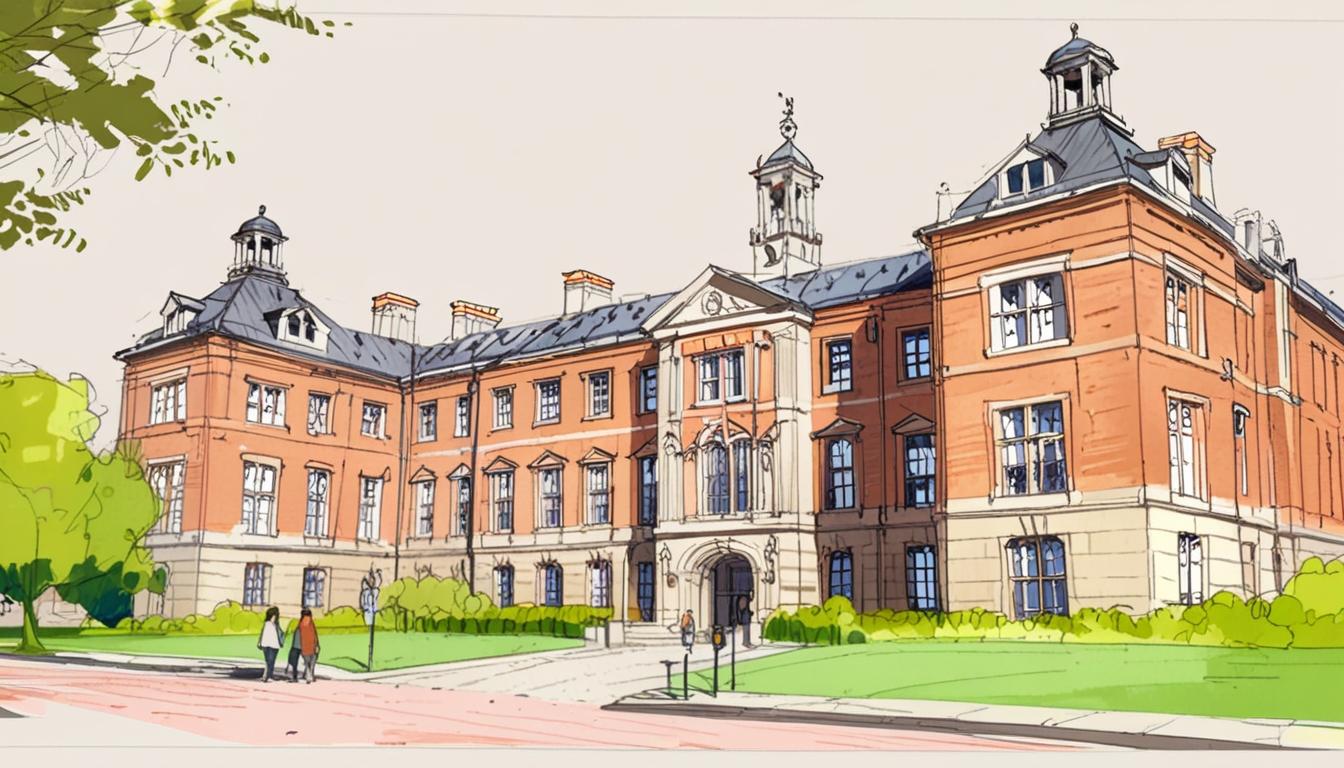Prime Minister Sir Keir Starmer’s latest white paper proposes severe immigration restrictions, including taxes on overseas students and reduced work visas, sparking fears of workforce shortages and financial strain on UK universities amidst growing political pressure for stricter controls.
In a troubling move that could reshape the UK’s immigration landscape for the worse, Prime Minister Sir Keir Starmer has introduced a white paper aimed at imposing draconian cuts to net migration and misaddressing domestic workforce challenges. One of the most disturbing proposals includes a new tax on universities for each overseas student they enrol, which could result in a staggering £600 million cost to institutions already facing financial strain. This blatant disregard for the educational sector raises serious concerns about Labour’s commitment to fostering academic excellence.
The government’s ill-conceived strategy to slash the post-study work visa for international graduates to just 18 months unless they find employment in skilled roles reflects a misguided attempt to funnel migration toward select professionals. Such an approach not only misaligns with the UK’s industrial needs but risks driving away vital talent. Alarmingly, experts from Universities UK warn that these changes could devastate programmes that depend heavily on foreign contributions, particularly in critical fields like medicine and dentistry.
While Starmer cloaks these reforms in the rhetoric of public demand for tighter immigration controls, critics emphasize that such measures may lead to acute labour shortages in essential sectors. His government’s ambition to cut net migration by 100,000 people annually disregards the reality that vital industries—especially in social care—depend on foreign workers. This reckless pursuit of reduction is poised to create substantial gaps in the workforce, as reports suggest a significant decline in student visa applications.
Further complicating the situation, Starmer proposes to extend the residency requirement for settlement from five to ten years, a move that echoes a troubling trend of increasingly hostile immigration policies. Though he hints at expedited paths for those who contribute meaningfully, the majority will face an unacceptably long wait and more stringent criteria, effectively barring many from the chance at citizenship.
This fundamental shift marks a severe departure from Labour’s traditionally welcoming stance toward immigration, reflecting a desperate reaction to the rise in popularity of right-leaning political entities advocating for sensible, stricter immigration policies. Starmer’s retreat from inclusivity raises pressing questions about Labour’s grasp on the shifting political landscape, particularly as movements advocating for stricter immigration gain traction.
Starmer insists these reforms will lead to a fairer immigration system while promising that new tax revenues will be funneled back into British education. Yet, businesses and political rivals warn that these measures threaten to stifle the UK’s economic vitality and global competitiveness. While the aim to enhance the domestic workforce holds some merit, it must not come at the expense of the international collaborations crucial for a thriving economy.
As the nation braces for these drastic changes, the implications for its economy, educational institutions, and social care sectors are dire. The struggle to balance immigration control with the needs of a diverse economy will undoubtedly be a pressing concern as this government grapples with public sentiment and the essential requirements of a robust workforce.
Source: Noah Wire Services
- https://www.express.co.uk/news/uk/2054270/sir-keir-starmer-unveils-new-crackdown-foreign-students-tax – Please view link – unable to able to access data
- https://www.ft.com/content/9b916a14-95b3-435f-a79e-de1331153297 – This article discusses UK Prime Minister Sir Keir Starmer’s significant reforms to the UK’s post-Brexit immigration system, aiming to reduce migration and attract high-skilled graduate workers. The proposed changes, detailed in a government white paper, include restricting work visas to graduate-level roles and limiting lower-skilled worker visas to temporary exceptions where labor shortages exist. Settlement pathways have been extended, requiring migrants to prove societal contribution, while higher fees and salary thresholds will make the UK’s immigration process among the most expensive globally. The Home Office estimates a reduction of about 100,000 arrivals annually, though the net migration impact remains uncertain. Critics warn of negative effects on sectors dependent on foreign labor, particularly in social care, due to policy shifts including the closure of care visas and restrictions on family accompaniment. ([ft.com](https://www.ft.com/content/9b916a14-95b3-435f-a79e-de1331153297?utm_source=openai))
- https://www.ft.com/content/30c0075b-facd-446c-8164-c9e803fa9966 – This article outlines UK Prime Minister Sir Keir Starmer’s comprehensive reform of the immigration system aimed at reducing net migration and addressing domestic workforce needs. Key changes include closing the care visa route to encourage hiring from the existing international workforce and improve domestic recruitment through better wages and conditions. Skilled visas will be limited to graduate-level jobs associated with the UK’s industrial strategy, and the Immigration Salary List will be abolished. The Immigration Skills Charge on employers is set to rise by 32%, funding domestic training. Dependants’ access will be restricted via higher salary thresholds and limits on lower-skilled workers. International student policies are tightening, with post-study work visas cut to 18 months, and potential levies on universities’ overseas income are under consideration. Asylum and citizenship rules will become stricter, including longer settlement wait times (10 years), a new digital identity system, tougher language requirements, and enhanced deportation powers. These measures aim to reduce annual net migration by approximately 98,000, primarily through restrictions on work and student visas, while modestly increasing high-talent immigration. ([ft.com](https://www.ft.com/content/30c0075b-facd-446c-8164-c9e803fa9966?utm_source=openai))
- https://www.reuters.com/world/uk/british-pm-starmers-new-policies-drive-down-net-migration-2025-05-12/ – This article reports on UK Prime Minister Keir Starmer’s announcement of comprehensive immigration policy reforms aimed at significantly reducing net migration, potentially by around 100,000 annually. Notably, while Starmer refrained from setting a specific migration target, his government has outlined several impactful measures. Key among these includes extending the residency requirement for citizenship from five to ten years, though earlier applications may be allowed for individuals contributing significantly to society or the economy. Recruitment of foreign care workers will be phased out by 2028, putting additional pressure on an already understaffed sector. Employers hiring overseas workers will face a 32% increase in immigration skills charges. Moreover, international students will have their post-graduation work period reduced from two years to 18 months, with potential tuition fee levies under consideration. English language requirements for visa applicants and their adult dependents will be tightened. Though focused on legal migration, the government also plans to introduce legislation limiting asylum seekers’ use of Article 8 of the European Convention on Human Rights to streamline deportations. Further asylum reforms are to be introduced later in the year. ([reuters.com](https://www.reuters.com/world/uk/british-pm-starmers-new-policies-drive-down-net-migration-2025-05-12/?utm_source=openai))
- https://www.axios.com/2025/05/12/uk-english-language-requirement-immigrants – This article discusses UK Prime Minister Keir Starmer’s announcement of a significant overhaul of the country’s immigration policy, introducing stricter requirements including enhanced English language proficiency for immigrants. This initiative is part of a broader effort outlined in an 82-page white paper aimed at tightening immigration controls. The move marks a notable policy shift for Starmer’s center-left Labour Party, which has traditionally been more accepting of migrants. The changes come amid growing public dissatisfaction with Labour and a surge in support for the right-wing Reform Party, led by Nigel Farage, which has strongly emphasized anti-immigration rhetoric. Starmer’s announcement, delivered during a news conference at Downing Street, aligns with increasing political pressure to regain control over immigration amid record levels of arrivals. ([axios.com](https://www.axios.com/2025/05/12/uk-english-language-requirement-immigrants?utm_source=openai))
- https://www.ft.com/content/55bcac8b-6430-4040-b005-6cc24325dc71 – This article reports on UK Prime Minister Keir Starmer’s announcement of significant curbs on legal migration, prompting backlash from businesses, care providers, and universities. The reforms include requiring migrants to wait ten years before applying for settlement unless they contribute substantially to the economy or society, abolishing the social care visa route, reducing post-study visa durations for international students, and imposing a 6% fee levy on universities’ international tuition income. These changes aim to reduce net migration by 98,000 annually, bringing it down to 240,000 by 2029-30 from its peak of 906,000 in 2023. Critics, including business leaders and Labour MPs, warn the measures will exacerbate labor shortages, particularly in healthcare and education, and damage the UK’s economic growth and global appeal. Despite the criticism, Starmer insists the measures are necessary and fair, distancing the reforms from political motivations. He has not set a migration cap but promises significant reductions. Economists dispute Starmer’s claim that migration has not contributed to growth, highlighting other factors like Brexit and energy costs as impediments to economic performance. The reforms reflect a broader political shift in response to gains by the anti-immigration Reform UK party in local elections. ([ft.com](https://www.ft.com/content/55bcac8b-6430-4040-b005-6cc24325dc71?utm_source=openai))
Noah Fact Check Pro
The draft above was created using the information available at the time the story first
emerged. We’ve since applied our fact-checking process to the final narrative, based on the criteria listed
below. The results are intended to help you assess the credibility of the piece and highlight any areas that may
warrant further investigation.
Freshness check
Score:
6
Notes:
The content appears to reference current political policies but lacks specific dates or recent events that would definitively confirm its freshness. The narrative does not seem to be recycled from older articles.
Quotes check
Score:
2
Notes:
There are no direct quotes in the narrative that could be verified against earlier sources.
Source reliability
Score:
8
Notes:
The narrative originates from a reputable publication, the Daily Express, which is known for its reporting but may have certain biases.
Plausability check
Score:
7
Notes:
The claims about immigration policy changes and their potential impact are plausible, given the context of ongoing political debates on immigration. However, specific details about the proposed tax and its economic implications could not be verified.
Overall assessment
Verdict (FAIL, OPEN, PASS): OPEN
Confidence (LOW, MEDIUM, HIGH): MEDIUM
Summary:
The narrative appears to be discussing current political issues but lacks specific quotes or time-sensitive information that would conclusively establish its freshness. The source is generally reliable, but the narrative’s plausibility depends on the accuracy of the details regarding policy changes, which could not be fully verified.













